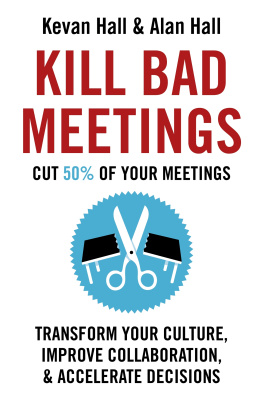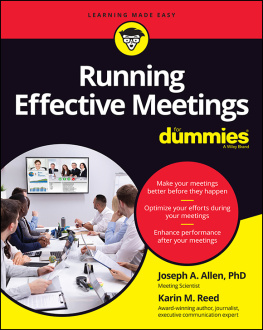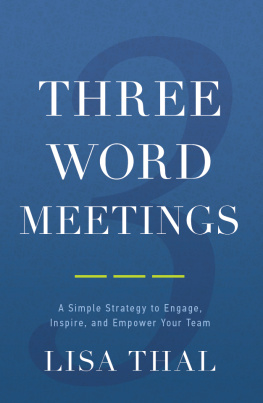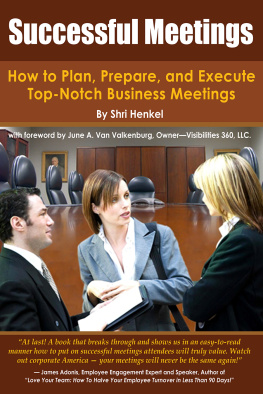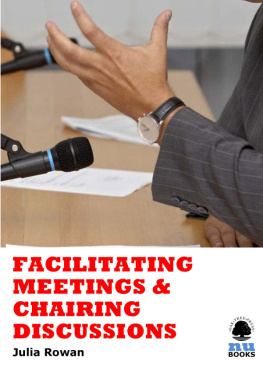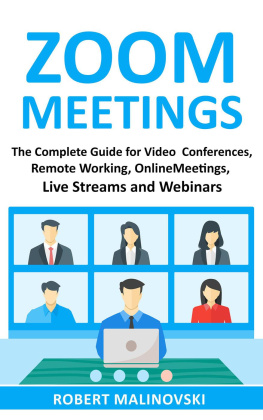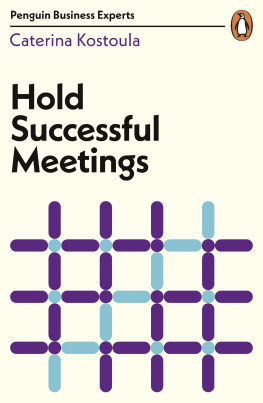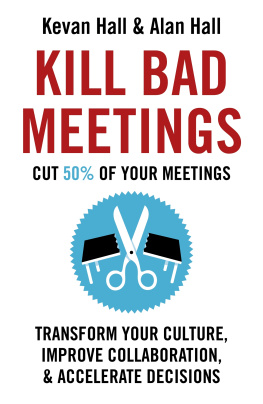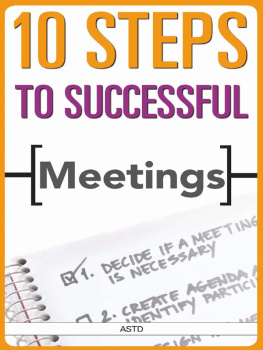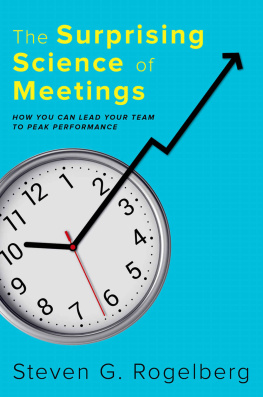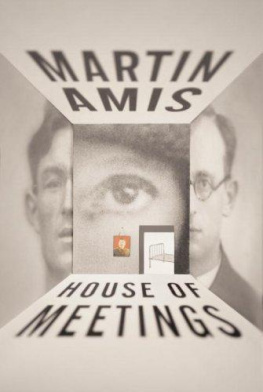Also by Kevan Hall
Speed Lead
Making the Matrix Work
Kill Bad Meetings
Cut 50% of your meetings to transform
your culture, improve collaboration,
and accelerate decisions
Kevan Hall and Alan Hall

www.nicholasbrealey.com
www.killbadmeetings.com
First published in 2017 by Nicholas Brealey Publishing
An imprint of John Murray Press
An Hachette UK company
Copyright Global Integration 2017
The rights of Kevan Hall and Alan Hall to be identified as the Authors
of the Work have been asserted by them in accordance with the
Copyright, Designs and Patents Act 1988.
All rights reserved. No part of this publication may be reproduced,
stored in a retrieval system, or transmitted, in any form or by any
means without the prior written permission of the publisher, nor be
otherwise circulated in any form of binding or cover other than that in
which it is published and without a similar condition being imposed on
the subsequent purchaser.
British Library Cataloguing-in-Publication Data
A catalogue record for this book is available from the British Library.
Hardback ISBN 978-1-47366-837-9
Trade paperback ISBN 978-1-47366-835-5
eBook (UK) ISBN 978-1-47366-836-2
eBook (US) ISBN 978-1-47366-843-0
To family and freedom
Acknowledgements
Many people contributed to the contents of this book, particularly our principal colleagues at Global Integration: Tony Poots, Phil Stockbridge, John Bland, Rod Farnan, Joff Marshall-Lee, T.H. Ong, and Robyn Green. They develop, apply, and improve these ideas every month in dozens of face-to-face and online training programs.
Thank you to our central support team who make sure our materials and programs get sold, produced, delivered, and paid for by new and existing clients globally, both online and in person.
Thank you to our many clients and the tens of thousands of participants on our training programs around the world, for challenging and improving these concepts and tools and keeping us focused on the practical applications to their real world. Only the things that really worked survived to be in the book.
Thanks also to all at Nicholas Brealey Publishing for helping us shape our ideas and share them with a wider population.
Contents
Preface
How would you like to save a day a week by cutting out completely unnecessary work?
You already suspect that half of what happens in meetings is not relevant or useful. Even the useful meetings are often badly run, do not meet their planned outcomes, and lack participation.
Despite this it is hard to persuade others to let you escape or to change the way meetings run.
This book will help you identify and disconnect from the 50 percent of unnecessary topics and meetings and improve the ones that remain to make them more effective, relevant, and engaging.
It will only cost you the time you need to read this book and apply some of the practical ideas you will find here. It could be the best investment in your productivity and engagement that you ever make.
Meetings are essential to any organization. They are where we collaborate and make decisions, and where we spend an average of two days per week of our time or over 15 years of our working lives.
Unfortunately, meetings are often unnecessary or badly run.
| Up to half of the content of meetings is either not relevant to participants or could be delivered more simply outside a meeting |
| Up to 20 percent of meeting participants should not be there |
| Up to 40 percent of meeting time is spent sharing information that could be delivered before the meeting |
| The meetings that do need to happen often fail to deliver their outcomes effectively and lack opportunities to participate |
We have spent the last 20 years working with increasingly complex teams and organizations. Most were virtual or global, many operating in complex matrix or network organization structures.
Collaboration in these and most other companies has become more widespread and more complex. Work increasingly cuts across the traditional silos to include colleagues from other functions, business units, and geographies. We struggle to be effective as members of multiple teams, working for multiple bosses, and engaging with a diverse network of colleagues and stakeholders.
Yet, as we work with these increasingly complex groups of people, time and again we find that the challenge comes back to meetings. Meetings are where collaboration happens, where decisions get made, and where people spend a lot of their least favorite time. People are frustrated with too many boring, irrelevant, or badly run meetings.
If we can fix the way we meet, which is a very tangible and achievable goal, we can have a huge impact on effectiveness, collaboration, and decision-making.
Kevan is an experienced line manager, CEO, and consultant whose previous books Speed Lead and Making the Matrix Work focused on getting things done more effectively in complex organizations. His consulting and training work has given him a broad view of meetings cultures in many of the worlds leading organizations.
Alan also knows about life in large organizations having worked in the packaged goods industry, most recently as a national account manager managing the relationship between the worlds largest food company and the UKs largest retailer. He brings the perspective of a Generation Y/millennial working through the challenges of management and meetings and questioning why it needs to be this way.
This book is focused on practical steps you can take to improve meetings. Where we have reduced the number and improved the quality of face-to-face and virtual meetings, we have seen significant improvements in collaboration, speed of decision-making, and employee engagement, as well as major reductions in cost.
Today meetings consume about 40 percent of working time for managers and professional people (our most expensive people).
| Our research shows that managerial and professional people on average spend two days per week in meetings |
| Bain and Company studied the time budgets of 17 organizations in detail and found that, on average, senior leaders devote two days a week to meetings and 15 percent of an organizations collective time is spent in meetings |
| A 2012 survey by salary.com found too many meetings to be the number one time-waster at the office, with 47 percent of votes, up from number three in 2008 |
For organizations, this is a huge cost. The typical managerial or professional person in Europe or the USA costs around $100,000 to employ (at 2017 prices). Some $40,000 of this is spent directly in attending meetings. Preparation for meetings is in addition to this, and internal meetings are also a major driver of business travel costs.
Because the salaries and expenses of people who prepare for and travel to meetings are spread across the whole organization the total cost of these meetings is often not visible.
One of our clients with 80,000 people worldwide calculated that the cost of unnecessary meeting attendance alone was $500 million per year and this drove an additional $400 million of travel costs. If we add in an assumption for preparation time, then we are looking at over $1 billion of wasted cost every year for just that one organization.
We may have full-time professionals managing budgets or spends of a tiny fraction of this, but anyone can call, run, and attend meetings just about whenever they want. The same individual who would need to get approval from three managers for their $200 flight can happily spend $40,000 per year of their time in meetings.
Next page
